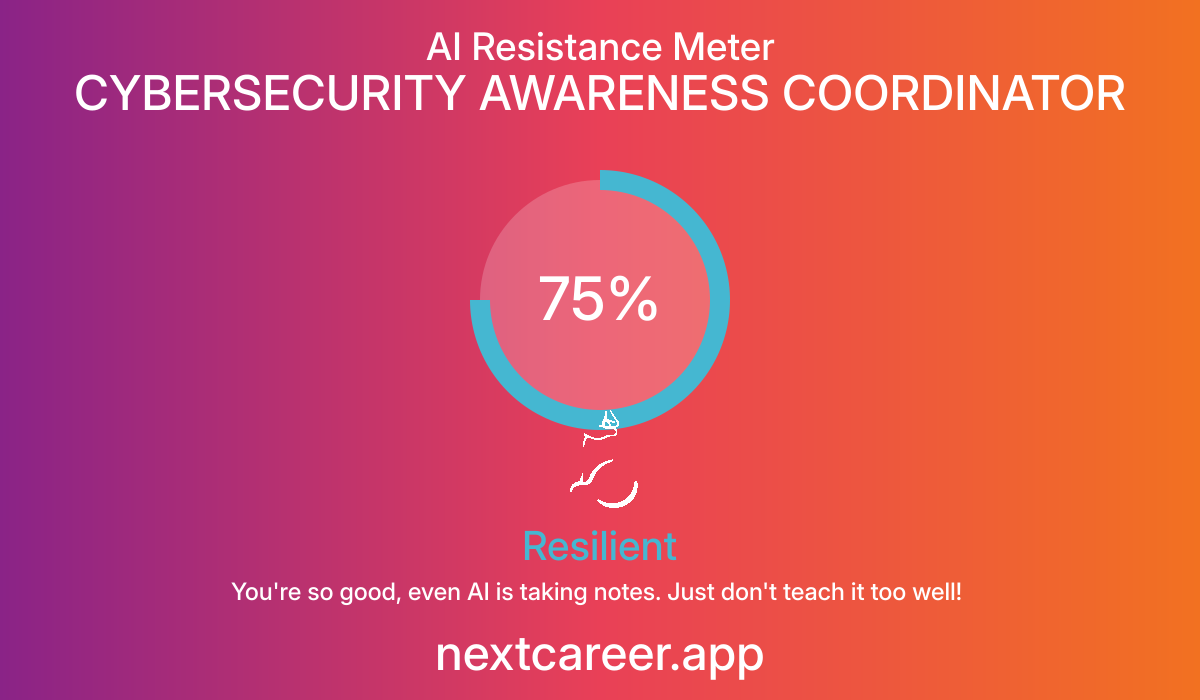AI Resistance Analysis
CYBERSECURITY AWARENESS COORDINATOR
CYBERSECURITY AWARENESS COORDINATOR
AI Resistance Score
AI Resistance Meter
Resilient
CYBERSECURITY AWARENESS COORDINATOR
You're so good, even AI is taking notes. Just don't teach it too well!
The role of a Cybersecurity Awareness Coordinator requires a blend of cognitive skills, emotional intelligence, and specific knowledge about both human behavior and technical systems. As AI continues to evolve, especially in areas such as automated threat detection and response, the technical aspects of cybersecurity may shift but the human-centric parts of the job will likely remain essential. AI may handle routine tasks, but the nuanced understanding of human behavior and the ability to effectively communicate and educate a workforce will be difficult for AI to replicate completely.
The role of a Cybersecurity Awareness Coordinator requires a blend of cognitive skills, emotional intelligence, and specific knowledge about both human behavior and technical systems. As AI continues to evolve, especially in areas such as automated threat detection and response, the technical aspects of cybersecurity may shift but the human-centric parts of the job will likely remain essential. AI may handle routine tasks, but the nuanced understanding of human behavior and the ability to effectively communicate and educate a workforce will be difficult for AI to replicate completely.
Key Factors
- Cognitive Tasks: While AI can analyze threats and data at scale, the need for strategic thinking and the ability to understand complex human contexts and organizational culture remains crucial.
- Emotional Intelligence: The ability to relate to people, understand their concerns, and motivate them to engage with security practices is a key aspect that AI cannot easily replicate.
- Physical Skills: The role doesn’t involve substantial physical skills; thus, this factor is not a significant consideration.
- Creative Thinking: Creating engaging and innovative training programs requires creativity, understanding of learning styles, and the ability to adapt to changing threats, which AI generally struggles with.
Human Advantages
- Humans can tailor their communication styles to diverse audiences more effectively than AI.
- Building trust and rapport with employees is inherently a human strength not replicable by AI.
AI Vulnerabilities
- AI can automate some awareness campaigns but may lack the nuanced approach required to engage employees effectively.
- AI's analysis capabilities can outpace human responses, leading to a reliance on automated solutions that do not consider human factors.
Recommended Actions
- Invest in continuous education about emerging AI tools and their implications for cybersecurity.
- Develop stronger interpersonal and communication skills to enhance engagement with staff.
- Incorporate AI into training modules to better illustrate potential threats and enhance learning experiences.
In the near term, AI will augment the role by assisting in data analysis and threat detection, allowing cybersecurity coordinators to focus on strategy and education. Over the long term, while AI will handle more operational aspects of cybersecurity, the need for human oversight, ethical considerations, and engagement strategies will ensure the relevance of coordinators in overseeing awareness and training programs.

Why Calculate AI Resistance?
Understanding how AI-resistant your career is becoming increasingly important in today's rapidly evolving job market. Our analysis combines multiple factors including required human skills, technological adaptability, and future industry projections to give you a comprehensive view of your career's sustainability.